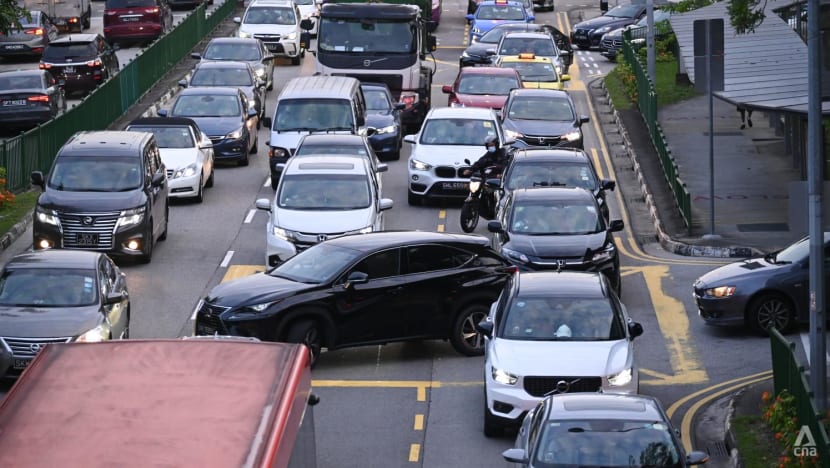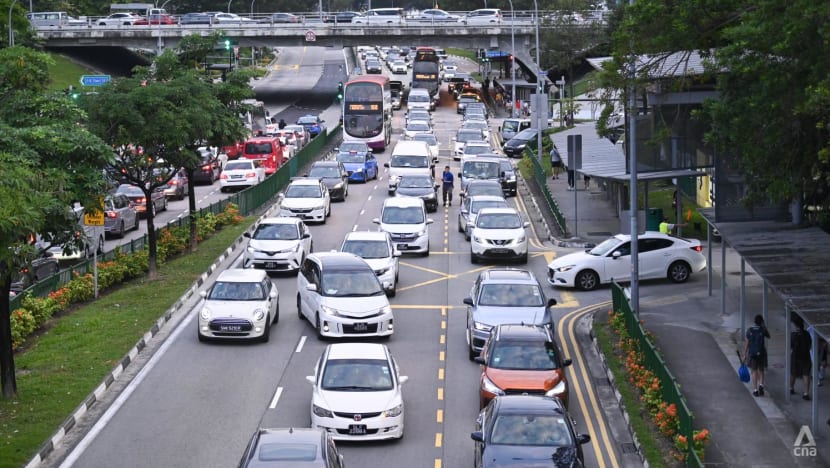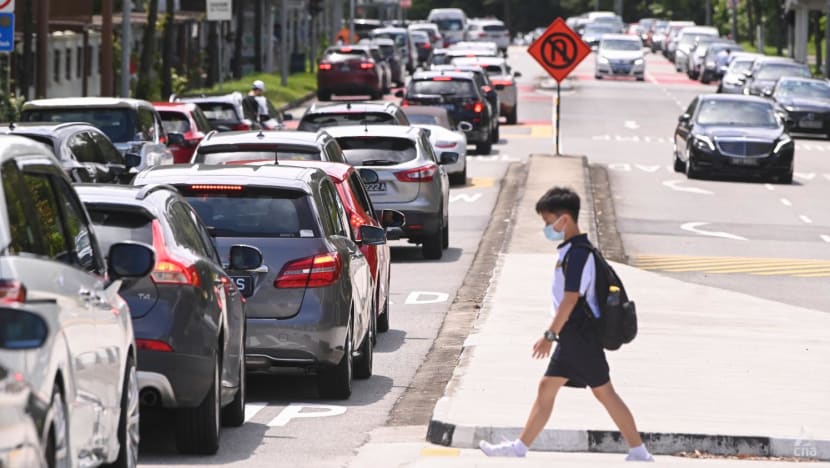Commentary: Are Singaporeans impatient and inconsiderate drivers?
From drivers who refuse to give way to signalling cars to those who love to use their car horn, it can sure feel like Singapore has many impatient and inconsiderate drivers, says writer Vivian Teo.


This audio is generated by an AI tool.
SINGAPORE: The taxi driver behind me unleashed a barrage of honks - once, twice, three times, each one more urgent than the last.
I started to get nervous, my heart rate quickening, as I tried to navigate across lanes to the extreme right in order to make a turn at the upcoming junction. It was obvious that the driver behind me wanted me to get a move on.
What he did not see was that there was another car before mine, signalling that it was also filtering to the right and I was waiting for it to go.
The “delay” we caused to the driver behind us was at most 10 seconds, there really wasn’t a need for him to sound his horn impatiently. If I had been pressured by the driver to change lanes quickly, there would have been a risk of an accident with the car in front.
Unfortunately, this unpleasant behaviour is not uncommon on Singapore’s roads.
Having to ferry my children to school and a job that has me travelling frequently around Singapore, I spend a lot of time on the road.
From drivers who refuse to give way to signalling cars to those who speed up to overtake in merging lanes and change lanes recklessly, it can sure feel like Singapore has many impatient and inconsiderate drivers.
It seems I’m not alone in feeling this way.
In the wake of a series of fatal accidents in Singapore, including one in Tampines that killed two people, drivers and pedestrians alike have highlighted their own harrowing encounters on the road.
In parliament on Tuesday (May 7), several Members of Parliament (MPs) raised questions about the road safety landscape in Singapore, including whether there was a need for a review of existing penalties.
DO SINGAPORE DRIVERS BEHAVE BADLY?
Last year, 136 lives were lost on the road - each one a son or daughter, a mother or father. The 2023 number of fatalities is nearly 26 per cent higher than the 108 lives lost in 2022.
Additionally, 8,931 people were injured in traffic accidents last year.
There was a “significant increase” in the number of accidents caused by motorists who either failed to keep a proper lookout, failed to properly control their vehicle or changed lanes without due care, said the Singapore Police Force in its annual road traffic report.
One wonders if some of those accidents could have been avoided if drivers simply exercised a bit of patience and some graciousness.
I remember at a parents’ briefing at my daughter’s school, the principal reminded parents about having good etiquette during drop-offs and pick-ups as traffic can get congested and hectic around the school during peak hours.
She noted that many people when interacting with others in person are usually nice and polite, yet when they get behind the wheels, they can morph into something else.
Deep Dive: Are Singaporeans bad drivers?


There is truth in her words. According to various studies in Australia, the US and China, between 60 and 80 per cent of drivers have experienced road rage in some way behind the wheels.
I too have been guilty of being testy when driving, sometimes rolling my eyes and muttering to myself: “What’s that silly car doing?” or “Why is the car in front so slow?”
Do we become aggressive and intolerant when we’re in a car because there is a certain degree of anonymity so we do not see a need to be polite and decent, much like trolls and keyboard warriors who make nasty comments behind screens?
Or is it just in the nature of Singaporeans to be kiasu, such that we can’t bear to even lose out on a few seconds by slowing down or giving way to another car?
CAN ONLY THE LAW MAKE THINGS BETTER?
The recent spate of accidents has led to questions on whether existing penalties are adequate, and if there should be stricter penalties on errant motorists.
In 2023, the authorities noted a decrease in violations detected by traffic enforcement cameras. At the same time, however, the number of speeding violations detected by other police enforcement operations increased by 22 per cent to 63,468.
"This shows that speed cameras are effective in deterring speeding, and that motorists choose to speed at locations where they think no one is watching," said the Singapore Police Force.
In April, the Traffic Police started progressively activating the speed enforcement function of red light cameras "to improve motorist behaviour". Since the function was activated, the cameras have caught more than 800 speeding violations.
I, too, agree that deterrence and monitoring by speed cameras help reduce reckless behaviour. Since the red-light cameras started monitoring speeding, I have also become more conscious and aware of speed limits on roads.
However, measures like fines and penalties have their limits. They may deter drivers from certain behaviour, but the driver is deterred out of fear of punishment rather than being altruistically-motivated, in which the driver avoids the behaviour knowing that it is dangerous.
WHAT NEEDS TO CHANGE
What really needs to change is the inherent behaviour and mindsets of drivers. I don’t have a solution to change our kiasu culture, but I am trying to do my part by being more patient and gracious towards other drivers, in the hopes that it will influence others to do the same.
When driving, I often remind myself to live and let live. I pay attention and drive according to speed limits; I give way to cars that need to filter into my lane; I slow down near pedestrian crossings.
A simple gesture of slowing down and giving way can make a difference, not just in helping someone or making another person’s day, but in preventing an accident or another life lost.
Much as I have plenty to gripe about when it comes to driving behaviours in Singapore, I have also encountered polite and gracious drivers who slow down for me to filter into their lanes or give a “thank you” gesture after having given way to them.
It is small actions like these that leave me hopeful that not all Singaporean drivers are self-entitled and obnoxious, and after experiencing a good turn, it does make me want to pay it forward by being patient and gracious towards other drivers as well.
My action as an individual is small but I can hope that one good turn will beget another, and perhaps the butterfly effect - the concept that everything in the world is connected and one small thing can have an impact on a much larger situation - will make our experiences on Singapore roads safer and more pleasant.
Vivian Teo was formerly a financial journalist and editor. She is now a freelance writer and children’s book author. She is also a mother-of-two who blogs at her parenting and lifestyle website.


















